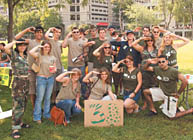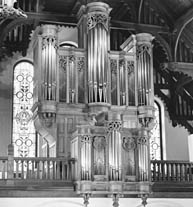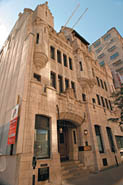Newsbites (Page 4)
Fun for New Recruits

Nicolas Morin
First-year Faculty of Arts students went through "boot camp" during Frosh Week at the start of the fall semester. Frosh activities on campus included a "Four Floors" party in the University Centre with DJs spinning different music on each floor, a field trip to the Sky dance bar, whitewater rafting excursions, a carnival, live music in the field around the Three Bares, and a scavenger hunt with a limo ride for the winners.
Organ Grinders

Courtesy Wolff and Associés
Every two years, talented young organists from around the world flock to Montreal to hone their skills with some of the planet's most respected masters of the instrument.
This year, teachers included international recording star Marie-Claire Alain, the winner of more than 15 Grands Prix du Disque, Olivier Latry, who balances his critically acclaimed CDs with his work as organist for the fabled Notre Dame Cathedral in Paris, and Quebec's Bernard LagacÈ, whose mastery of Bach helped him earn both the Grand Prix du QuÈbec and the Order of Canada.
The McGill Summer Organ Academy, described by The American Organist magazine as "refreshing, stimulating and inspiring," is the only one of its kind in North America and is the brainchild of Professor John Grew, former Dean of the Faculty of Music and current chair of the organ area.
"There are organ academies like this in Europe and, traditionally, that's where North Americans have gone for advanced training," says Grew, who organized McGill's first summer academy in 1997. "I made several of these pilgrimages myself and they had a major impact on my life."
Montreal is an ideal location, explains Grew. "This is the greatest centre of organs in North America." No city on the continent can challenge Montreal for the quality or diversity of its organs, many of them designed by such well-respected instrument builders as Casavant, Wilhelm and Von Beckerath, and located in some of the city's most beautiful churches. "We're the envy of quite a few major European cities as well." The academy makes use of many of these sites - not to mention McGill's own custom-built French classical organ, located in Redpath Hall. Grew says the students tend to be upper-level undergraduates and graduate students, with a sprinkling of "passionate amateurs." Students work with one instructor, depending on their area of interest.
Grew, for instance, is an award-winning authority on early French music. "We get the best international experts in specific repertoires," explains Grew.
The high-profile instructors also participate in a series of public concerts. "We organize them on a shoestring and thousands of people attend the performances," he notes.
Grew was recently contacted by organizers from the Festival du Comminges, a 25-year-old organ festival in France, interested in discussing possible collaborations. Plans are in the works to have the McGill academy offered annually, with the location alternating between Montreal and France, and Grew couldn't be more pleased. "This would really raise McGill's profile internationally."
Home Sweet Home

Owen Egan
It's official. Renovations are complete - mostly - and the McGill Alumni Association and the Development Office have moved into their new headquarters in the former Seagram Building at Peel and St. Catherine streets. It's the heart of the heart of the city, surrounded by boutiques, restaurants, and much of the Montreal workforce.
A gift to McGill from Vivendi International, the building dates from 1928. Its castle-like exterior reflects the Scottish baronial style that architect David Jerome Spence used to allude to the whiskey distilled by Seagram, which was founded by the Bronfman family. Inside, patriarch Samuel Bronfman's office remains as it was when he ran the Seagram company and will house Vice-Principal (Development and Alumni Relations) Nancy Wells. The rest of the five floors bring together more than 90 employees from fundraising, the Alumni Association, and systems support, with the exception of Communications staff and the McGill News, who will have a new home soon across from Martlet House.
If you're planning to write or visit the Alumni Association, you'll want to take note of the new address: 1430 Peel St., Montreal, Que., H3A 3T3. Phone and fax numbers remain the same, as do email addresses.


